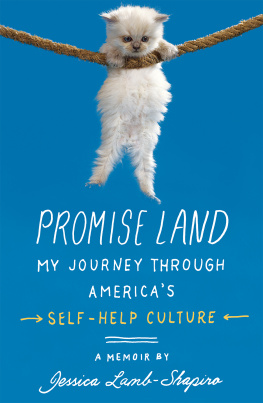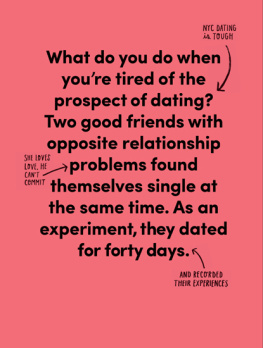We hope you enjoyed reading this Simon & Schuster eBook.
Join our mailing list and get updates on new releases, deals, bonus content and other great books from Simon & Schuster.
C LICK H ERE T O S IGN U P
or visit us online to sign up at
eBookNews.SimonandSchuster.com
Thank you for downloading this Simon & Schuster eBook.
Join our mailing list and get updates on new releases, deals, bonus content and other great books from Simon & Schuster.
C LICK H ERE T O S IGN U P
or visit us online to sign up at
eBookNews.SimonandSchuster.com

Simon & Schuster
1230 Avenue of the Americas
New York, NY 10020
www.SimonandSchuster.com
Copyright 2014 by Jessica Lamb-Shapiro
All rights reserved, including the right to reproduce this book or portions thereof in any form whatsoever. For information address Simon & Schuster Subsidiary Rights Department, 1230 Avenue of the Americas, New York, NY 10020.
First Simon & Schuster hardcover edition January 2014
SIMON & SCHUSTER and colophon are registered trademarks of Simon & Schuster, Inc.
Dan Clark, May It Come True, from Chicken Soup for the Soul , edited by Jack Canfield and Mark Victor Hansen. Copyright 1992 by Dan Clark. Reprinted with the permission of The Permissions Company, Inc., on behalf of Health Communications, Inc., www.hci.com.
Hope Edelman, Motherless Daughters: The Legacy of Loss . Quoted with permission of Da Capo Press.
From The Rules . Copyright 1995 by Ellen Fein and Sherrie Schneider. By permission of Grand Central Publishing. All rights reserved.
A Grief Observed , by C. S. Lewis. Copyright 1961 by C. S. Lewis Pte. Ltd. Extract reprinted by permission.
The Simon & Schuster Speakers Bureau can bring authors to your live event. For more information or to book an event contact the Simon & Schuster Speakers Bureau at 1-866-248-3049 or visit our website at www.simonspeakers.com.
Interior design: Aline C. Pace
Jacket design: Rex Bonomelli
Jacket photograph Juniors Bildarchiv GmbH/Alamy
Author photograph Jason Frank Rothenberg
Library of Congress Cataloging-in-Publication Data
Lamb-Shapiro, Jessica.
Promise land : my journey through Americas self-help culture / Jessica Lamb-Shapiro. First Simon & Schuster hardcover edition.
pages cm
RA776.95.L348 2014
616.890092dc23 2013011014
ISBN 978-1-4391-0019-6
ISBN 978-1-4391-0160-5 (ebook)
NOTE TO READER
I have mostly used peoples real names and descriptions. Where a small degree of anonymity was required, I used peoples first names only. Where a greater degree of anonymity was required, I changed first names and one or two small details about their background.
Most of the websites mentioned in this book have changed since I wrote about them, and presumably will continue to change. One or two of them may no longer exist. All quotes and descriptions of websites were accurate at the time that I accessed them.
For my father
The first thing to bear in mind (especially if we ourselves belong to the clerico-academic-scientific type, the officially and conventionally correct type, the deadly respectable type, for which to ignore others is a besetting temptation) is that nothing can be more stupid than to bar out phenomena from our notice, merely because we are incapable of taking part in anything like them ourselves.
W ILLIAM J AMES , 1902
Most of [self-help] is of a character to repel persons of critical taste. Its language is crude. It makes assertions in regard to scientific matters that cannot be proved.... It is mixed up with spiritism, astrology, mind-reading, vegetarianism, reincarnation, and all sorts of other crank doctrines and fadsand with a few actual fakes. The very names of its publications are enough to make sophisticated persons smile.
F RANCES M. B JRKMAN, WRITER/CRITIC , 1910
CONTENTS
The Power of Inspirational Tales
Control and the Defense Against Loss
The Power of Positive Thinking
The Cult of Expertise
Vision Boards and the Law of Attraction
Overcoming Phobias and Fears
On Grief and Grieving
The Future of Self-Help
What Kind of Life Is Worth Living
PROLOGUE
ON MISSING THE OBVIOUS
Ten years ago, I tagged along with my father to a weekend conference on how to write self-help books. The conference headliner, Mark Victor Hansen, coauthored Chicken Soup for the Soul , one of the most popular and prolific self-help series of the twentieth century, and my father hoped to learn the secrets of his success. A child psychologist by training, my father had been writing self-help books for parents and children for over thirty years, but he had never created a best seller. In college, he studied playwriting, but after penning several bad plays about the homeless, he switched his major to psychology. Throughout his twenties, he worked as a therapist, but he never gave up on writing. When my mother was pregnant with me, my father began work on his first parenting book, Games to Grow On . By the time he was finished I was almost two years old.
On page 100 of Games , my father describes The Perfect Child Game. He instructs the reader to finish the following sentence:
That was 1979. By the time we went to the conference in 2003, my father had written over forty books and workbooks and started a catalog that sold therapeutic books, games, and toys. Most of his books were self-published and sold through his catalog to schools and psychologists. Four of his books had been published by major houses, but he had never achieved the success of someone like Dr. Phil, a name I picked not at random but because my father particularly despises Dr. Phil (as do, incidentally, many others with Internet access, a facility with Photoshop, and access to a seemingly unlimited cache of devil-themed clip art). I often think of Dr. Phil as my fathers bizarro doppelgngera middle-aged, mustachioed psychologist who dispenses advice, but who has made a more prosperous living and is devoted to a pop psychology that my father not only disagrees with but feels is ethically irresponsible. My father would probably also point out here that he has more hair than Dr. Phil.
At the conference, my father and I witnessed a pedagogy more befitting a tent revival than a classroom. Mark Victor Hansen proclaimed; his congregants exulted, swooned, and wept. Coming into contact with their tumescent, vigorous emotion made me feel alienated, but I also felt pangs of jealousy. I didnt have anything in my life that I felt as passionate about. Even though I had recoiled from self-help and its myriad incarnations my entire life, my interest was piqued. What voodoo made the self-betterment crowd, here and everywhere, so devout? I wanted to know why people liked self-help so much, what it meant to them, whether it worked; and if it didnt work, why people still craved it.

Its nearly impossible to live in the world and escape self-help. We are surrounded all the time by its bastard derivatives. In my local auto body shop, a yellowed sign hanging over the saddest couch in the world proclaims, WE CREATE OUR TOMORROWS BY WHAT WE DREAM TODAY . An e-mail in my in-box tells me to take heart in this moment and know the best is yet to come. A poster in my hardware store, of a kitten clinging to a tree branch, proffers three simple words: HANG IN THERE .
These axioms may seem like throwaway items, mental tchotchkes that people use to shield themselves from the routine horrors of daily life. They may go unnoticed by us most of the time, but they exist in our peripheral vision, and I am one of those people who believes that we ingest these things accidentally, and that they must have some niggling, if not profound, effect on our psyches, with the most unfathomable consequences. These aphoristic posters and bumper stickers and signs and calendars and pens and e-mails and T-shirts and coffee mugs contain small but constant assurances that the point of view of the universe toward us is not one of overwhelming indifference.
Next page














